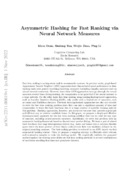Khoa D. Doan, PhD
Browse by
Khoa D. Doan is currently an Assistant Professor of Computer Science in the College of Engineering and Computer Science at VinUniversity, Hanoi, Vietnam. Prior to his current appointment, he worked as an AI Researcher at Baidu Research, USA. He received his PhD in Computer Science at Virginia Tech, and MS in Computer Science at the University of Maryland, College Park. In the past, he worked as a senior Software Engineer at various enterprise software companies, and as a senior Data Scientist/Researcher in high-performance and distributed computing projects at NASA and various advertising companies, such as Criteo AI Lab. Besides research, he also spends time engaging and advising AI technology with startups. More information about him can be found at https://khoadoan.me. Email: khoa.dd@vinuni.edu.vn
Recent Submissions
-
Asymmetric hashing for fast ranking via neural network measures
(2022-11)Fast item ranking is an important task in recommender systems. In previous works, graph-based Approximate Nearest Neighbor (ANN) approaches have demonstrated good performance on item ranking tasks with generic searching/matching ... -
Asymmetric hashing for fast ranking via neural network measures
(2022-11-01)Fast item ranking is an important task in recommender systems. In previous works, graph-based Approximate Nearest Neighbor (ANN) approaches have demonstrated good performance on item ranking tasks with generic searching/matching ... -
Unified Energy-Based Generative Network for Supervised Image Hashing
(2023)Hashing methods often face critical efficiency challenges, such as generalization with limited labeled data, and robustness issues (such as changes in the data distribution and missing information in the input data) in ... -
Defending backdoor attacks on vision transformer via patch processing
(2023-01-16)Vision Transformers (ViTs) have a radically different architecture with significantly less inductive bias than Convolutional Neural Networks. Along with the improvement in performance, security and robustness of ViTs are ...




